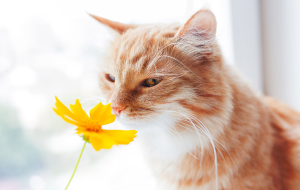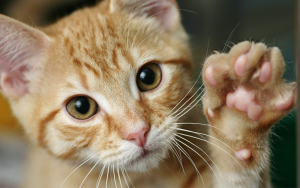Why Is My Cat Coughing? Understanding the Causes, Symptoms, and Treatment Options

Introduction:
As a cat owner, it’s never easy to watch your beloved feline companion struggle with coughing or any health issue. While an occasional cough might not be cause for immediate concern, persistent coughing could indicate an underlying health problem that
needs attention. Cats, like humans, can suffer from a variety of respiratory conditions, and understanding why your cat is coughing is essential for providing the right care.
In this article, we will explore the possible causes of coughing in cats, how to recognize the symptoms, when to seek veterinary care, and the best treatment options available. By the end of this guide, you’ll have a better understanding of your cat’s
health and the steps you can take to ensure their well-being.
1. Common Causes of Coughing in Cats
Coughing in cats can be caused by several factors, ranging from mild irritants to more serious underlying health issues. Below, we will break down the most common causes of coughing in cats:
a) Respiratory Infections:
Upper respiratory infections (URIs) are one of the most frequent causes of coughing in cats. These infections can be viral, bacterial, or fungal. The most common viruses responsible for URIs in cats include feline herpesvirus and calicivirus. Infected
cats may exhibit coughing, sneezing, nasal discharge, and watery eyes. Bacterial infections, such as Bordetella bronchiseptica, can also cause coughing and respiratory distress.
b) Asthma:
Feline asthma is a chronic condition that affects the airways of a cat’s lungs. It is caused by inflammation and constriction of the bronchial tubes, leading to difficulty breathing, wheezing, and coughing. Asthma is more common in middle-aged to older
cats, particularly those with a history of allergies or exposure to environmental irritants such as cigarette smoke, dust, or strong cleaning products.
c) Heartworm Disease:
Though more common in dogs, heartworm disease can also affect cats, and coughing is one of the most noticeable symptoms. Heartworms are parasitic worms that are transmitted through mosquito bites and can affect the lungs, causing coughing, wheezing, and
difficulty breathing. Because heartworm disease is difficult to diagnose and treat in cats, it’s essential to consult with a veterinarian if you suspect your cat might be infected.
d) Allergies:
Cats can develop allergies to a variety of environmental factors, such as pollen, dust mites, mold, and even certain foods. These allergies can lead to coughing, sneezing, itching, and respiratory distress. If your cat’s coughing seems to coincide with
seasonal changes or exposure to specific allergens, allergies might be the cause.
e) Foreign Objects:
If a cat inhales or swallows a foreign object, it can become lodged in their airway, causing irritation and coughing. Common foreign objects include hairballs, small toys, or pieces of food. If your cat’s coughing is sudden and accompanied by signs of
distress or difficulty breathing, it’s important to seek emergency veterinary care.
f) Lung Diseases:
Chronic conditions such as pneumonia, bronchitis, and pulmonary fibrosis can also lead to coughing in cats. These diseases often result from bacterial infections, long-term exposure to irritants, or other respiratory problems. If your cat has a persistent
cough, it could indicate a more serious lung condition that requires professional treatment.
g) Cancer:
Though less common, respiratory cancers, such as lung tumors or nasal cancer, can also cause coughing in cats. Cancer-related coughing is usually persistent and may worsen over time. If your cat’s coughing is accompanied by weight loss, lethargy, or changes
in appetite, it could be a sign of a more serious condition like cancer.
2. Recognizing the Symptoms: How to Tell If Your Cat’s Coughing Is Serious
Coughing can be an occasional occurrence in cats, but if it becomes persistent or is accompanied by other worrisome symptoms, it’s time to take action. Here are some signs that the coughing might indicate a more serious health problem:
a) Persistent or Frequent Coughing:
Occasional coughing can be normal, especially if it occurs after your cat is playing or has a minor irritation in their throat. However, if your cat is coughing frequently or for an extended period, it’s important to consult a veterinarian to rule out
serious conditions.
b) Difficulty Breathing or Wheezing:
If your cat’s cough is accompanied by labored breathing, wheezing, or panting, this could indicate a respiratory emergency. Difficulty breathing should never be ignored, as it could be a sign of asthma, heartworm disease, or a foreign object blocking
the airway.
c) Discharge from the Nose or Eyes:
Excessive nasal or eye discharge often accompanies respiratory infections. If you notice your cat coughing along with runny eyes or a stuffy nose, it could indicate a viral or bacterial infection that requires medical attention.
d) Lethargy and Loss of Appetite:
If your cat is coughing and also showing signs of lethargy, loss of appetite, or weight loss, these could be signs of a more serious health issue, such as cancer or lung disease.
e) Gagging or Vomiting:
If your cat is coughing so intensely that it leads to gagging or vomiting, it may indicate an airway obstruction or other underlying health issue. This requires immediate veterinary attention.
3. When to Seek Veterinary Care
If your cat’s coughing persists for more than a day or is accompanied by other concerning symptoms, it’s time to visit the veterinarian. It’s always better to err on the side of caution when it comes to your pet’s health. Some situations where you should
seek immediate veterinary care include:
- Persistent coughing that lasts for more than 24 hours
- Difficulty breathing or wheezing
- Sudden or severe coughing episodes
- Coughing accompanied by fever or signs of infection
- Lethargy, loss of appetite, or weight loss
- Gagging or vomiting following a coughing episode
A veterinarian will be able to diagnose the cause of your cat’s coughing through a combination of physical exams, lab tests, and diagnostic imaging, such as X-rays or ultrasounds.
4. Diagnosing the Cause of Coughing in Cats
When you bring your cat to the vet, they will likely perform a thorough examination to determine the cause of the coughing. Common diagnostic procedures may include:
- Physical Exam: A complete checkup to evaluate the overall health of your cat and check for signs of respiratory distress.
- Blood Tests: These tests can help identify infections, inflammation, or other underlying issues.
- X-rays or Ultrasound: Imaging techniques are often used to look for foreign objects, lung disease, heart conditions, or tumors.
- Endoscopy: In some cases, a veterinarian may perform an endoscopy to inspect your cat’s airways and lungs more closely.
- Allergy Tests: If allergies are suspected, your vet may recommend allergy testing to pinpoint specific allergens.
5. Treatment Options for Coughing in Cats
The treatment for your cat’s coughing will depend on the underlying cause. Below are some potential treatment options:
a) Respiratory Infections:
For bacterial infections, antibiotics may be prescribed. Viral infections typically require supportive care, such as hydration and rest, to help your cat recover. In some cases, antivirals may be needed.
b) Asthma:
If your cat is diagnosed with asthma, your veterinarian may recommend anti-inflammatory medications such as corticosteroids or bronchodilators to help open the airways. In more severe cases, long-term treatment with inhalers or oral medications may be
necessary.
c) Heartworm Disease:
Heartworm disease in cats is difficult to treat and usually requires hospitalization. Medications such as corticosteroids may be used to reduce inflammation, and in some cases, surgery might be necessary to remove heartworms.
d) Allergies:
If allergies are identified as the cause of your cat’s coughing, your veterinarian may recommend antihistamines or steroids to control symptoms. Reducing exposure to allergens is also crucial for preventing flare-ups.
e) Foreign Objects:
If a foreign object is found in your cat’s airway, it may need to be removed through endoscopy or surgery.
f) Lung Diseases or Cancer:
Treatment for lung diseases or cancer depends on the specific condition. Medications, antibiotics, or chemotherapy may be used to manage symptoms or treat infections. Surgery might be required in cases of tumors.
Conclusion
Coughing in cats is often a symptom of an underlying health issue, and it’s essential to take it seriously, especially if it becomes persistent or is accompanied by other concerning signs. By understanding the potential causes and symptoms of coughing
in cats, you can take the necessary steps to ensure your feline companion receives the proper care and treatment. Always consult with a veterinarian if you notice any unusual coughing or other signs of illness in your cat. Early diagnosis and treatment
can help improve your cat’s health and quality of life.







